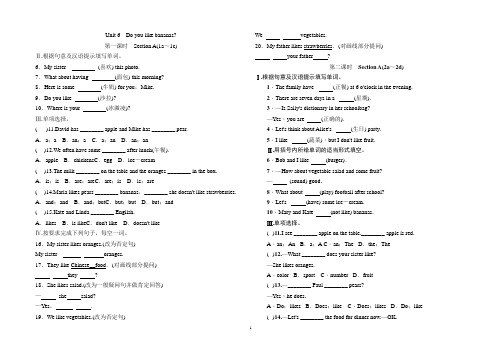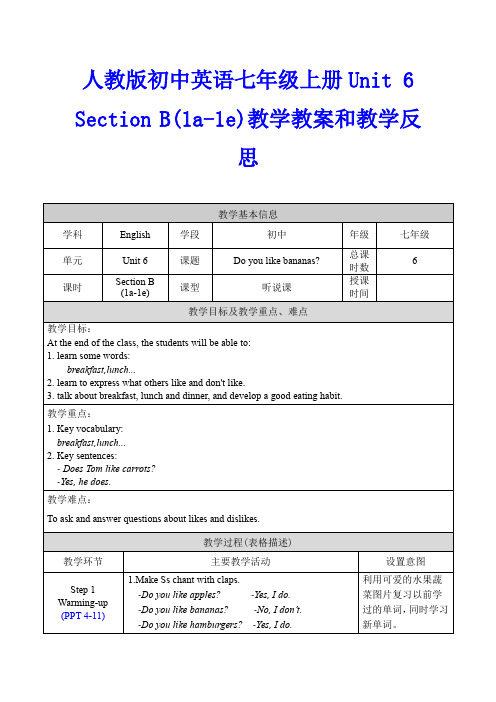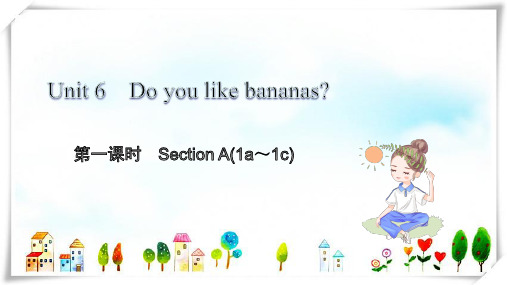Unit 6Do you like banana1.doc1
- 格式:doc
- 大小:1.99 MB
- 文档页数:3

Unit 6Do you like bananas?第一课时Section A(1a~1c)Ⅱ.根据句意及汉语提示填写单词。
6.My sister (喜欢) this photo.7.What about having (面包) this morning?8.Here is some (牛奶) for you,Mike.9.Do you like (沙拉)?10.Where is your (冰激凌)?Ⅲ.单项选择。
( )11.David has ________ apple and Mike has ________ pear.A.a;a B.an;a C.a;an D.an;an( )12.We often have some ________ after lunch(午餐).A.apple B.chickensC.egg D.ice-cream( )13.The milk ________ on the table and the oranges ________ in the box. A.is;is B.are;areC.are;is D.is;are( )14.Maria likes pears ________ bananas,________ she doesn't like strawberries. A.and;and B.and;butC.but;but D.but;and( )15.Kate and Linda ________ English.A.likes B.is likeC.don't like D.doesn't likeⅣ.按要求完成下列句子,每空一词。
16.My sister likes oranges.(改为否定句)My sister oranges.17.They like Chinese__food.(对画线部分提问)they ?18.She likes salad.(改为一般疑问句并做肯定回答)—she salad?—Yes,.19.We like vegetables.(改为否定句) We vegetables.20.My father likes strawberries.(对画线部分提问)your father ?第二课时Section A(2a~2d)Ⅰ.根据句意及汉语提示填写单词。



Unit 6Do you like bananas?Period 1(Section A 1a-1c)Teaching aims1. Learn words and be able to say, read and write them:orange(s), banana(s), strawberry, strawberries, pear(s), apple(s),tomato(es), carrot(s), vegetable(s), hamburger(s), egg(s), ice-cream(s),salad(s), bread, chicken2. Be able to talk about likes and dislikes by using:I/We/They like oranges. He/She likes oranges.I /We/They don’t likebananas. He/She doesn’t like hamburgers.Do you like salad? Yes, I do./No, I don’t.Does he/she like tomatoes? Yes, he/she does. / No, he/she doesn’t.3.Understand the difference between countable nouns and uncountable nouns.Teaching key and difficult points:1.Learn these words and be able to say, read and write them:2.Be able to talk about likes and dislikes by using:I/We/They like oranges. He/She likes oranges.I /We/They don’t likebananas. He/She doesn’t like hamburgers.Do you like salad? Yes, I do./No, I don’t.Does he/she like tomatoes? Yes, he/she does. / No, he/she doesn’t. Moral objects(1)To call students ’ attention to otherserests and’ei n ablet themto care more about classmates.(2)To improve Sts ’communicating skills and enable them to keeptheir health.教学设计备注Step 1. Warm-up and revision(1)Daily greeting to the students(2)Revision: What ’s this/that in English ? What coloris it?T:What ’s this in English? (show a picture of andorange)T:What color is it?Step 2. Presentation –New words.(1)Go on asking: What ’s this/that in English ? Whatcolor is it?T:What ’s this in English? (show a picture of anapple and if the student don’t know it, show thephonetic symbol of the word.)T: Spell it, please.S: A-P-P-L-E.T: What color is it?S: It ’s red.(Present the other three words as above: pear,strawberry, banana )T:We can call all of these things fruit . (Teach the newword “fruit ”.)Show pictures and ask the Ss “What arethese/those? ”and ask the SS to spell the pluralforms of these words: oranges, apples, pears,strawberries, bananas.(2)Repeat step (1) to present: carrot, carrots,tomato, tomatoes and vegetable, vegetables.(3)Present some more words by showing pictures. Get theSs to make an effort to pro nounce and spell the new words.Bread, hamburger ,hamburgers, milk, ice-cream,ice-creams, salad, chicken ,an egg, eggsWe can call all of these things food:食物3.Memory Challenge: Who has the best eyes?(1)Show the pictures, and say the plural forms of the nouns andsome uncountable noun.(2)Summarize. 可数名词有复数形式 , 不可数名词一般没有复数形式Step 3Presentation Target language 11. Show the pictures and say:I like tomatoes, but I don’ t like bread.2.Let students say:I like, but I don’t like ....3. Show the pictures and say:She likes bread, but she doesn’t like milk.He likes chicken, but he doesn’t like eggs.4.Let students say: He/She likes , but he/she doesn’tlike ....According Ss’answers and say:5. Sing a chant:Bananas, bananas, I like bananas! Salad, salad, I like salad!Strawberries, strawberries,I don ’t like strawberries!Pears, pears, he likes pears!Milk , milk, he likes milk!Tomatoes, tomatoes,He doesn ’t like tomatoes! Step 4 Work 1a .1. Read the words.2.T: Look at the pictures and fill in the chart .Fruit Food Vegetable3.Match the words with the things in the picture.4.Check the answers .Step 5 Present the new language 1 .1. T: Oh, we have lots of delicious fruits . I like apples best.Do you like apples ?S1 :Yes , I do. I like apples.S2: No, I don't . I like salad.T: Do you like salad ? S3: Yes , I do. I like salad./ No, I don't . I don’tlike salad.Step 6 Pairwork .1. T: Work in pairs .Ask and answer with your partners .(Before class the students have draw some pictures of the food )2. Get the Ss to ask and answer in pairs, using the sentences:’t.A: Do you like ?B: Yes, I do./ No, I don 3. When you ask andanswer, please fill in the chart. Name Like DislikeStep 7 Present the new language 2 .1.Show pictures and ask and answer questionsDoes she/he like ?Yes, she/he does. She/He likes/ No, she/he doesn ’t. She/He doesn ’tlike .Step 8 Pairwork .1. T: Work in pairs .Ask and answer with your partners .2.Get the Ss to ask and answer in pairs, using the sentences:Does she/he like ?Yes, she/he does. She/He likes/ No, she/he doesn ’t. She/He doesn ’tlike .3.According Ss’answers and ask “Do they like ? Yes, they do./ No, they don’t.”Step 9 Work on 1b.1.T: 1b. List en and number the conversations.2.Listen.3.Check the answers.4.Read after the tape.Step 10 work on 1c.1.First, practice the conversations in 1b.Then, make a survey and fill in the chart below.2. Report: I like milk and tomatoes, but I don’t like ice-cream. Mary likes oranges, but she doesn’liket milk orice-cream. Tom likes tomatoes and strawberries, but hedoesn ’ t like bread.Step 11 . HomeworkWrite down the report.Blackboard design:New Words Unit 6 Do you like bananas?Do you like?Yes , I do. I likeNo ,I don ’t. I don ’tlikeDoes she/he like ?Yes, she/he does. She/He likes/No, she/he doesn ’t. She/He doesn ’tlike.Period 2(Section A 2a-2d)Teaching aims:1. Words & expressionsBirthday, dinner, week, think about, food, sure, how/whatabout ? Burger, vegetable, fruit, apple, then2. Target languageI like strawberries, they’re delicious. Let’s have them.--Yes, I like them ,too./ No, I don’tlike them.I like salad, it ’s delicious. Do you like it?-- Yes, I do./No, I don’t but I likeice cream.Let ’ s have Let ’s think about the food.Ability goalsEnable students to talk about likes and dislikes.Learning ability goalsHelp students learn how to talk about likes and dislikes.2. Listening and speaking skills.Moral object:Learn to keep healthy.Teaching important / difficult pointsHow to talk about likes and dislikes with the target language.教学设计备注Step1 Warm up and revision.1.Everyday greeting.2.Review.Show the pictures and say the singularforms and the plural forms of the countable nouns.3.Show some pictures of the uncountable nouns.4.Summarize.(1).当可数名词复数再次出现时,用“They( 主语)或 them(宾语)”替代。


Unit 6 Do you like bananas?Lesson planI.Teachin.aims1.Knowledg.aims.通过本节课学习, 同学们能够熟练地、正确地使用以下单词: k.bread2.Abilit.aims.熟练运用以下句型:.like.…..don’.like.….-D.yo.like.…. -Yes..do..No..don’t..-She/H.likes...She/H.doesn’.like.….-Doe.she/h.like.…..-Yes.she/h.does. No.she/h.doesn’t.3.Emotio.aims.讨论美食, 了解同学间的喜好, 养成健康的饮食习惯。
II.Teachin.difficulties1.学会使用交际用语:“Do you like……?”以及第三人称单数形式;2.可数名词和不可数名词的分类。
III.Teachin.procedure1.Step1.Warmin.up2.Greetings.3.Show the learning aims.4.Memory challenge.(Review the new words and the plurals of them)5.Recognize the countable nouns and uncountable nouns.Step2.Leading-in1.T..lik.strawberries..don’k.Ho.abou.you?S1..lik.bananas..don’.lik.pears.S2..like...don’.like.…2.S..lik.hamburgers..don’.lik.tomatoes..ask.th.othe.Ss.He/Sh.likes.…He/Sh.doesn’.like.…3.Le.S.practic.i.pairs.A..like..….don’.like..B.He/Sh.likes.…He/Sh.doesn’.like.…4.Ac.out.1.Step3.PracticeT.Jus.now.you’v.go.it..lik.strawberries.D.yo.lik.strawberries?S.Yes..do..No..don’t.(As.S.on.b.one.)2.Practic.th.conversation.i.pair.an.the.ac.out.3.T.D.yo.like.….S.Yes..do..No..don’t..ask.th.others.Doe.he/sh.like.…. Ss.Yes.he/sh.does. No.he/sh.doesn’t..th.tw.picture.t.practic.th.conversation.an.the.ac.out.5.Tel.Ss.I.yo.wan.t.kee.fi.lik.tha.bo.i.th.picture.yo.shoul.ea.mor.fruit.an.vegetables.Yo. shouldn’.ea.muc.jun.foo.lik.hamburgers.Step4.Listening1.1b.Numbe.th.conversations.(Catc.th.ke.words)2.Chec.th.answer.an.rea.together.3.2a.Circl.th.foo.yo.hear.4.2b.Liste.agai.an.fil.i.th.blanks.5.Chec.th.answer.an.rea.together.Step5.Writing1.Accordin.t.th.char.abou.tw.students.like.an.dislikes.writ..passage.(A.leas..sentences.)2.Le.som.student.t.rea.an.correc.them.Step6.SummaryI.thi.class.we’.o.foods.fruit.an.vegetable.an.practice.askin.an.answerin.question.abou .like.an.dislikes.An.remembe.th.rule.o.nou.plurals.Step7.Homework1.复习记忆本课所学的单词。
Unit 6 Do you like bananas?话题Topic 谈论食物Talk about food功能Functions 1.能够谈论对食物的喜好Talk about likes and dislikesI like…/I don’t like…2.能够询问别人喜欢什么Talk about what other people likeDo you like…? Do they like …? Does she like…?语法Grammar 一、掌握动词like在一般现在时中的用法The simple present tense to like二、肯定句和否定句Affirmative and negative statementsI don’t like salad.John likes hamburgers.三、一般疑问句及其简略回答Yes/No question and short answersA:Do you like bananas?B:Yes, I do./No, I don’t.A:Does she like tomatoes?与方法在日常生活中运用英语的能力。
2.通过图片提供物体的名称,运用实际例子,感知、学习Do you like…? Yes, I do./No, I don’t. Does he like …? Yes, he does./No, he doesn’t.I don’t like…围绕上面的句型展开操练。
通过调查了解学生们喜欢什么、不喜欢什么,然后在此基础上评价自己和他人的生活是否健康。
情感态度与价值观1.通过任务型活动,使学生们在实际生活中均衡饮食,合理配餐。
2.通过开展小组活动,指导学生积极与他人合作,培养他们的合作精神。
Sectio n A 概述1.本单元主要围绕“谈论对食物的喜好”这一交际功能展开,并以like为例,进一步学习实义动词在一般现在时中的用法,是上一个单元内容的2.活动2让学生使用所学语言谈论自己对不同食物、运动类型以及颜色的喜好。
人教新目标英语:七年级上单元检测卷:Unit6Do you like bananas(1)Unit 6 Do you like bananasI.单项选择(15分)1. Mary______ salad.A . don't like B. doesn't likeC. doesn't likesD. like2. There is some ______ on the plate(盘子).A. orangesB. breadC. bananasD. tomatoes3. We should eat ______ food.A. unhealthB. healthyC. healthD. unhealthy4. My brother ______ an apple.A. want eatB. wants eatingC. wants to eatD. wants eat5. What does he ______ the food?A. think ofB. thinks ofC. thinks aboutD. thinking about6.—Does your mother like white?—.A. Yes, she is.B. Yes, she do.C. No, she doesn’t.D. No, she isn’t.7.—does your father have lunch?—Rice, vegetables and bananas.A. What, toB. What, forC. How, onD. How, for8. His mother always asks him his eating habits.A. aboutB. forC. atD. to9.Let's ______ to school,OK?A. goB. goesC. to goD. going10.—Do you like chicken?—______.A. Yes,I doB. No,I' m notC. Yes,he doesD. No,she doesn't11.I have three_______ in my house, but I don’t like to eat _________.A. chickens, chickensB. chickens, chickenC. chicken , chickenD. chicken , chickens12.I like ____________.A. strawberryB. strawberrysC. strawberriesD. an strawberry13.--__________________he like?--Ice-creamA. What areB. What’sC. What doD. What does14. --________does she like?--She ________oranges.A. What, likeB. What , likesC. What’s, likesD. What’s, like15.—Jack is a _______ boy, he can do it _______A. good, goodB. well, wellC. well, goodD. good, wellII. 完形填空(10分)I have three children. Mike is my son. Lily and Lucy are my ___1_____ names. Their eating habits are not ____2____. So it is difficult to make meals for ____3____. Mike likes hamburgers fo r breakfast, ____4____ his two sisters don’t. For ____5____, Mike often eats chicken but the girls often eat vegetables. For dinner, my children usually have some ____6____ like apples, bananas and strawberries.They all like playing ___7____. Mike likes playing basketball ____8____ his friends. Lily and Lucy ____9____ to play ping-pong. Playing sports is ____10____ for their health.1. A. daughter B. daughter’s C. daughters’ D. daughter2. A. the same B. the difficult C. a same D. difficult3. A. him B. her C. them D. his4. A. and B. but C. so D. /5. A. breakfast B. lunch C. dinner D. supper6. A. fruit B. food C. vegetables D. orange7. A. a sport B. sporting C. sports D. sport8. A. after B. and C. with D. at9. A. have B. like C. come B. has10. A. well B. bad C. good D. fineⅢ.阅读理解(20分)AMy name is Anna. I’m very healthy. I eat fruit and vegetables every day. I like pears and apples, but I don’t like oranges. I like carrots and tomatoes for lunch.Lily is my sister. She likes strawberries and bananas, but she doesn’t like pears. She like hamburgers and ice-cream very much. She eats them every day. And she is fat.Jane is my cousin. She likes apples. She eats an apple every day. She doesn’t like chicken. She likes fruit salad. She likes to have it for dinner every day.1. Who is Anna?A. She’s Lily’s friend.B. She’s Jane’s cousin.C. She’s Jane’s sister.D. She’s Lily’s cousin.2. ________ like apples.A. Anna and LilyB. Lily and JaneC. Anna and JaneD. Anna , Jane and Lily3. Whose eating habit is not healthy?A. Anna’s.B. Lily’sC. Jane’sD. Ann and Lily’s4. What does Anna eat every day?A. Pears and oranges.B. Apples and ice-cream.C. Fruit and vegetables.D. Fruit and oranges.5. Jane likes to have ________ for dinner.A. fruit saladB. applesC. chickenD. orangesBJane is a school girl. She is twelve. She studies at a middle school. She is in Grade Seven. She is a good girl. Jane gets up at seven in the morning. Then she has her breakfast. For breakfast she has eggs and a cup of milk. She doesn't have tea for breakfast.After breakfast Jane goes to school. At twelve she comes home from school. She has lunch with her mother. For lunch she has hamburgers and salad. She likes salad,but she doesn't like hamburgers.At seven she has supper with her father and mother. They have chicken and vegetables. Her father likes chicken,but Jane doesn't.6. Jane is a school girl in a ______.A. primary schoolB. middle schoolC. universityD. college7. Jane has ______ for breakfast.A. eggs and a cup of milkB. eggs and teaC. tea and milkD. vegetables8. Jane comes home______.A. in the morningB. at noonC. at nightD. in the evening9. Jane likes to eat______ for lunch.A. hamburgersB. milkC. saladD. eggs10. Jane has dinner with______.A. her motherB. her parentC. her fatherD. her parentsIV. 情景交际:从方框中选择适当句子补全对话。
《Unit 6 Do you like banana? 》说课稿Section A 1 (1a-2d)一、教学目标:1. 语言知识目标:1) 能掌握下列词汇:banana, hamburger, tomato, ice-cream, salad, strawberry, pear, milk, bread, birthday, dinner, food, week, sure, How about …?, burger, vegetable, fruit, right, then2) 能掌握以下句型:①—Do you like salad? —Yes, I do. / No, I don’t.②—Does she/he like …? —Yes, she/he does./ No, she/he doesn’t.③—I like … /I don’t like …④—He/Sh e likes … / He/She doesn’t like …3) 能通过介绍食物学会询问对方喜欢与不喜欢的食物。
2. 情感态度价值观目标:该部分学习内容贴近学生的生活,谈论的主题涉及学生的饮食习惯和偏爱,对学生养成健康的饮食习惯很有帮助,能引起学生的特别关注,极易于激发学生学习英语的欲望和兴趣,使他们乐于参与各种英语实践活动。
通过学习西方食品文化,促使学生了解西方生活方式与文化,培养跨文化交际的意识。
二、教学重难点1. 教学重点:1) 学习并积累一些食物的词汇。
2) 名词复数的使用。
3)动词like一般现在时的各种句式及一般疑问句的肯定、否定回答;2. 教学难点:1) 行为动词like的一般现在时的用法;2) 使用do和does引导的一般疑问句的构成和使用。
三、教学过程I. New wordsAccording the pictures, learn the new words.II. Warming-upAsk some Ss questions:T: What’s that?S1: It’s _______.T: What are those?S1: They are _______.III. Presentation1. Show some pictures of food on the screen and learn the new words.(banana, hamburger, tomato, ice-cream, salad, strawberry, pear, milk, bread, birthday, food, burger, vegetable, fruit)2. Let Ss read and try to remember the new words.3. T: Let’s look at the picture in 1a. Match the words with the things in the picture. Thencheck the answers.IV. ListeningT: Let’s work on 1b. Listen and number the conversations [1-3].Ss listen to the tape and number the conversations.V. Pa ir work1. Read the conversations in 1b. Have Ss read after the teacher.2. Now let’s act out the conversations 1-3.(Ss work with their partner and act out the conversation 1-3.)3. Look at the picture and make more conversations using the words in 1a.4. Let some pairs act out their conversations.VI. Listening1. Point to and read each word aloud, Ss only listen. Then let some Ss read the words bythemselves. Check that Ss understand the meaning of the ea ch word.2. Play the recording for the first time, Ss only listen.3. The n play the recording again Ss circle the words they hear. Play the recording again.Check the answers.4. A girl and a boy want to have something in the restaurant. Do they like hamburgers? Doesthe boy like milk? Does the boy like ice-cream? Now let’s listen to the recording.For the first time, Ss only listen.For the second time, Ss listen and fill in the blanks.Play the recording for the third time, Check the answers.VII. Pair work1. Read the conversation in speech bubbles in 2b. Ask Ss to read after the teacher.2. Ss practice the conversations in pairs.3. Let some pairs act out the conversations.4. Ss give answers that are true for them. Then practice their conversations.5. Ask some pairs act out their conversations.VIII. Reading1.According the pictures, learn the new words.2.Read the dialogue in 2d. Then answer the questions.Does John like hamburgers?What does Jack don’t like?What fruit does John like?3. Read the dialogue with your partner. Then role play the conversation.4. Practice the conversation with your partner.5. 评价:(让学生们对自己的表现及语言表达能力进行自我评价,在小组内评价,然后进行评出最优秀的小组。
Unit 6 Do you like bananas?一、用所给词的正确形式填空(每小题1分,共10分)1.Ben's uncle ______(eat)carrots every day.2.My sister wants ______(be) healthy.3.Are these your ______(strawberry)?4.Let's ______(have)chicken for dinner.5.Three ______(tomato)are on the table.6.Eric ______(have)bread for lunch.7.Sports star eats ______(good).8.He has two ______(watch).9.I like ______(salad).10.The boy likes ______(play)tennis.二、单项选择(每小题1分,共15分)1.—______your grandmother watch TV in the evening?—_____.She doesn't like watching TV.A.Does;No,she doesn't B.Doesn't;Yes,she doesn'tC.Does;Yes,she does D.Doesn't;No,she does2.—Tom likes eggs______ breakfast.—I don't like eggs at all.A.with B.in C.for D.by3.—Lin Ming ______baseball.He plays chess(国际象棋).—Oh,it isn't good for him.A.don't play B.doesn't play C.doesn't have D.don't have4.—Some chicken ______on the table;help yourself!(随便吃点)—Thank you very much.A.has B.have C.is D.are5.—What do you and your cousin ___?—I___a baseball and my cousin______two volleyballs.A.have;has;have B.have;have;have C.has;have;has D.have;have;has6.—What do you have for breakfast?—______ egg.A.A B.An C.The D./7.Do you eat ______ at school?A.well B.good C.nice D.fun8.I like carrots,and I eat ______ for breakfast.A.it B.they C.them D.us9.Let's ______ to school,OK?A.go B.goes C.to go D.going10.—Do you like chicken?—______.A.Yes,I do B.No,I' m notC.Yes,he does D.No,she doesn't11.Mary______ salad.A.don't like B.doesn't like C.doesn't likes D.like12.There is some ______ on the plate(盘子).A.oranges B.bread C.bananas D.tomatoes13.We should eat ______ food.A.unhealth B.healthy C.health D.unhealthy14.My brother ______ an apple.A.want eat B.wants eating C.wants to eat D.wants eat15.What does he ______ the food?A.think of B.thinks of C.thinks about D.thinking about三、完形填空(每小题2分,共20分)My name is Sandra.I have a brother.__1__name is Tom.We like different(不同的)sports.I like playing__2__.It is fun.I like tennis,too.__3__I don't like basketball.It is __4__. My brother__5__basketball.He has four basketballs.He__6__basketball every day.We like different__7__.I like eggs,apples and hamburgers__8__breakfast and dinner.For dessert(甜食),I like__9__.Tom likes oranges,chicken and carrots.We are__10__because(因为)we often playsports and eat good food.1.A.He B.She C.Her D.His2.A.volleyball B.TV C.watch D.oranges3.A.And B.With C.But D.Of4.A.fun B.difficult C.interesting D.fine5.A.likes B.don't like C.like D.doesn't like6.A.looks B.knows C.plays D.has7.A.food B.books C.colors D.classes8.A.in B.on C.for D.at9.A.hamburgers B.chicken C.bread D.icecream10.A.boring B.healthy C.great D.relaxing四、阅读理解(每小题2分,共30分)ATom:Good evening,Mum.Mum:Good evening,Tom.Tom:Do we eat chicken for dinner,Mum?Mum:No,we eat fish and carrots,dear.Tom:Mum,I don't like carrots.I like chicken.Mum:But we need more vegetables,not only meat.It's not healthy to eat chicken every day.Tom:OK.But dad likes chicken,too.Mum:Well,let's eat chicken and tomatoes tomorrow.Tom:That sounds great!1.What do they eat for dinner?A.Chicken. B.Carrots.C.Carrots and fish. D.Fish.2.What does Tom want to eat for dinner?A.Fish. B.Chicken.C.Broccoli. D.Carrots.3.What do they need to eat more?A.Chicken. B.Meat.C.Vegetables. D.Fish.4.Does Tom's father like chicken?A.No,he doesn't. B.Yes,he does.C.We don't know. D.No,he does.5.What will they eat tomorrow?A.Fish and carrots. B.Chicken and fish.C.Chicken and carrots.D.Tomatoes and chicken.BJane is a school girl.She is twelve.She studies at a middle school.She is in Grade Seven.She is a good girl.Jane gets up at seven in the morning.Then she has her breakfast.For breakfast she has eggs and a cup of milk.She doesn't have tea for breakfast.After breakfast Jane goes to school.At twelve she comes home from school.She has lunch with her mother.For lunch she has hamburgers and salad.She likes salad,but she doesn't like hamburgers.At seven she has supper with her father and mother.They have chicken and vegetables.Her father likes chicken,but Jane doesn't.6.Jane is a school girl in a ______.A.primary school B.middle schoolC.university D.college7.Jane has ______ for breakfast.A.eggs and a cup of milk B.eggs and teaC.tea and milk D.vegetables8.Jane comes home______.A.in the morning B.at noon C.at night D.in the evening 9.Jane likes to eat______ for lunch.A.hamburgers B.milk C.salad D.eggs10.Jane has dinner with______.A.her mother B.her parent C.her father D.her parentsCMary is my cousin.She is only nine years old(岁).She is in Class 2,Grade 4.She likes sports.(A)She plays baseball every day. Her math teacher is Mrs.Brown.Mrs.Brown has a daughter.Her name is Mona.She is Mary's good friend.She is nine,too.(B)And she likes sports,too. But she doesn't like playing baseball.She likes playing pingpong.(C)她有九个乒乓球。